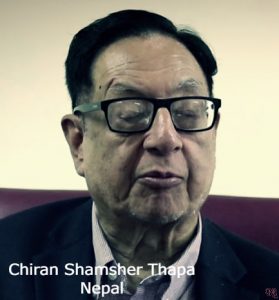Chiran S. Thapa
Member
Nepal Council of World Affairs ( NCWA)

Questions were raised about Nepal’s history of independence as we applied for membership of the United Nations in the late nineteen hundred forties ‘No foreign flag has flown over Nepal’. This was the gist of the explanatory note buttressing Nepal’s sovereign independence. It was pointed out too that Nepal had its own army, officered entirely by her own nationals, and we made war and concluded peace without reference to a third party.
There are few sovereign independent states which at one time or another did not come under foreign rule. Powerful colonial powers including France, Belgium, Netherland’s among others, for example, were the victims of foreign invasion as late as a decade before Nepal’s UN application.
Our legacy of independence is a precious heritage, which we have to preserve and promote in circumstances, which have changed in the last half of the twentieth century and even more during the first dozen years of the twenty- first century. For much of the twentieth century and earlier, countries which prized their independence had to use the arsenal of military and non-military resources for the overarching goal of retaining their sovereignty and territorial integrity.
The global and regional trend today is one of co-operation and mutually beneficial interdependence. These times call on us a sovereign people to aim high and leave no stone unturned to do what we must in the best interests of our country and people and abandon what we cannot. The agenda ought to be one of goal-setting ones, but within the constraints of Nepal’s size, level of development and Nepal’s geographic location and handicaps.
Our geographic location and the country’s terrain are such that we have to deepen strategic partnerships which give us the freedom to pursue the country’s best interests. Our international borders have to be secure and our defense capability has to be second to none within the constraints of the country’s resources.
We should optimizing benefits from nature’s gifts: Our resources, mountains and river basins, provide the country the gifts to develop for multipurpose uses of irrigation, hydropower, water transport for the benefits of our own people and those of our neighboring countries. The country’s diplomatic practice has to rise to garner maximum benefits for the people of the river basins’ upstream locations and reasonable residual needs of the other riparian countries. Diplomacy requires bargaining for optimal development of entire river basins to promote the rights of the people of upstream flow areas. We should ensure benefits to downstream riparians too.
Nepal is working towards an inclusive peace process which will hopefully be enshrined in a constitution to be drawn up by the Constituent Assembly. This is unprecedented in the country’s history. There is no better time than now to strengthen the country’s diplomatic theories and practice rising toward solutions in problem areas and striking out in new directions to meet new challenges.
Other countries, smaller in size and population than Nepal, have extracted the optimal benefits for their people. Switzerland, for example, has worked out practical co-operation in transit transport with her neighbours for advanced trade relations and state-of-the-art tourism and banking networking with high- worth economies.
Scandinavian countries, Norway, Finland, Denmark, among others, have helped in closure of the peace processes as for example brokered by Finland in Indonesia/Aceh and the less successful Norwegian effort in resolution of the ethnic conflict in Sri Lanka. Public opinion in Scandinavia supports the role of their relatively smaller countries to work as ‘superpowers’ of resolution of conflicts, peace building and post-combat reconstruction.
The image of these relatively smaller countries has been enhanced as they have devoted time, energy and resources in mitigating conflict and bringing about interstate understanding. Sometime before Switzerland reached its present level of high per capita income, it had been acting to protect the diplomatic interests of conflict protagonists. It has continued during the early nineteen seventies as the diplomatic interlocutor for India/Pakistan and presently as the official go- between for U.S.-Iran in the absence of traditional diplomatic bilateral relations.
A country’s image or that of a constituent unit’s profile can be damaged for different number of reasons, but we have fortunate instances of dramatic improvement of a geographic area in the world’s perception. Until very recently, everything that Myanmar/Burma did was unacceptable and called for new sanctions. Now the image of the country has changed. In the past the Indian state of Bihar was known for wrong reason. Under the present Chief Minister, it is a role model not only for provincial units but even for countries!
Image has had a dramatic turnaround because of solid proof of achievement, reduction of crime and high-growth economic achievements in Bihar. We see beginning of what looks like a credible democratic process in Myanmar too.
Image is of interest in diplomatic practice because of the benefits which accrue to a country in inward investment, tourist inflow and general business and people-to-people interactions. Even before the conclusion of the peace process in Nepal, with just the absence of hostilities, tourist numbers have increased and the prospects of inward investment have brightened. We need to manage to go from the post-combat situation to a post-conflict situation which would be the crowning achievement of the conclusion of the peace process enshrined in a people’s Constitution. Then new vistas would open in inward investment, trade, tourism, air-links, employment and education for Nepali nationals abroad!
High-quality diplomacy has to aim for adding value in the country’s international interactions. Many Spaniards, Italians, Greeks, among others came to the economically advanced countries of Europe in the postwar period as laborers, gendarmes. As their children and the children’s children had access to first- rate educational systems, the newer generations have risen to be CEOs of major firms, and managers in high-tech information and technology sectors. Once our workers manage to take families in advanced countries, their children’s access to high-quality education may well be a greater benefit to the household than the wages earned. If laborers are not permitted to bring families, the government should play an enabling role for workers to learn foreign languages and acquire basic skills in IT and semi-skills, carpentry, electric wiring, basic secretarial work in Nepal itself, to support, encourage and help the private sector’s initiatives. The country’s decades-long experience in hospitality management, hotel work and banking give opportunities for Nepali personnel in relatively high-grade employment, with concomitant income earnings.
With tourism bringing major foreign exchange earnings, attention has to be given to increase not only tourist numbers but also the expenditure per capita and longer stays. The first foreigners came to Nepal to climb the Himalaya Mountains. They were joined by tourists who wanted to see our monuments, temples and cultural architecture. Others came to visit nature reserves and animal sanctuaries to see rhinos, tigers, alligators, still others want to sample adventure tourism, whitewater rafting. Diplomacy has to work to develop new areas of interest and make sure that the message is conveyed of what Nepal has to offer and it has to be supported by on-the-ground facilities provided domestically, including adventure tourist facilities, paragliding, bungee jumping, etc.
In an international environment of co-operation, dialogue and interaction are favorable toward physically handicapped countries such as ours. We can work toward using international best practices. It is anybody’s guess when the next big earthquake will hit our country, so we cannot do better than to have an earthquake preparedness center with the co-operation of Japan.
The country faces immediate and long-term challenges in energy security and climate change. The vast bulk of our export earning goes to buy POL imports, and this situation calls for reconfiguring the country’s transport and other energy-consuming structures for most cost-effective allocation of energy use and optimal use of domestic production of energy resources. Diplomacy has to gear itself to finding the best suppliers of POL suppliers while it tackles the search for cutting-edge technology firms capable of doing feasibility studies and construction of hydropower plants whose water supply needs are also used for irrigation and other benefits.
The country needs to use our best minds and invest in their training and education to have climate change in the country’s favour. The Himalayas and other mountain chains south, the Siwalik, Chure and Bhabar require preservation so that they continue to fulfill our growing water and forest product needs. Diplomacy has to actively engage with the individuals, institutions and instruments occupied with climate change studies and practices, learning from them and adjusting them to mitigate our climate-specific problems.
High-quality diplomacy for a new Nepal is desired. We have examples of countries smaller in size and population and with geographical handicaps which have managed to advance by using diplomatic skills in the best interests of their people and country. We should put our mind to it as one united people we cannot rise to the occasion. 
Our needs require that we do so. Even though our peace process and constitution- drafting are beset with differences among political parties, ideologies and ethnic demands, there is agreement that we must do the best in our diplomacy. We have to pick and choose our best minds and elevate our foreign policy goals and make the necessary adjustments in our diplomatic practice and theory. A favorable international environment poses no hindrance and instead aids a long-term effective response in the best interests of Nepal and our people to the challenges that we face.
Text courtesy: The Nepal Council of World Affairs, NCWA Journal 2012.
Thanks the distinguished author Shri Chiran S. Thapa and the editorial team of the NCWA Journal 2012: Ed. Upadhyaya.
